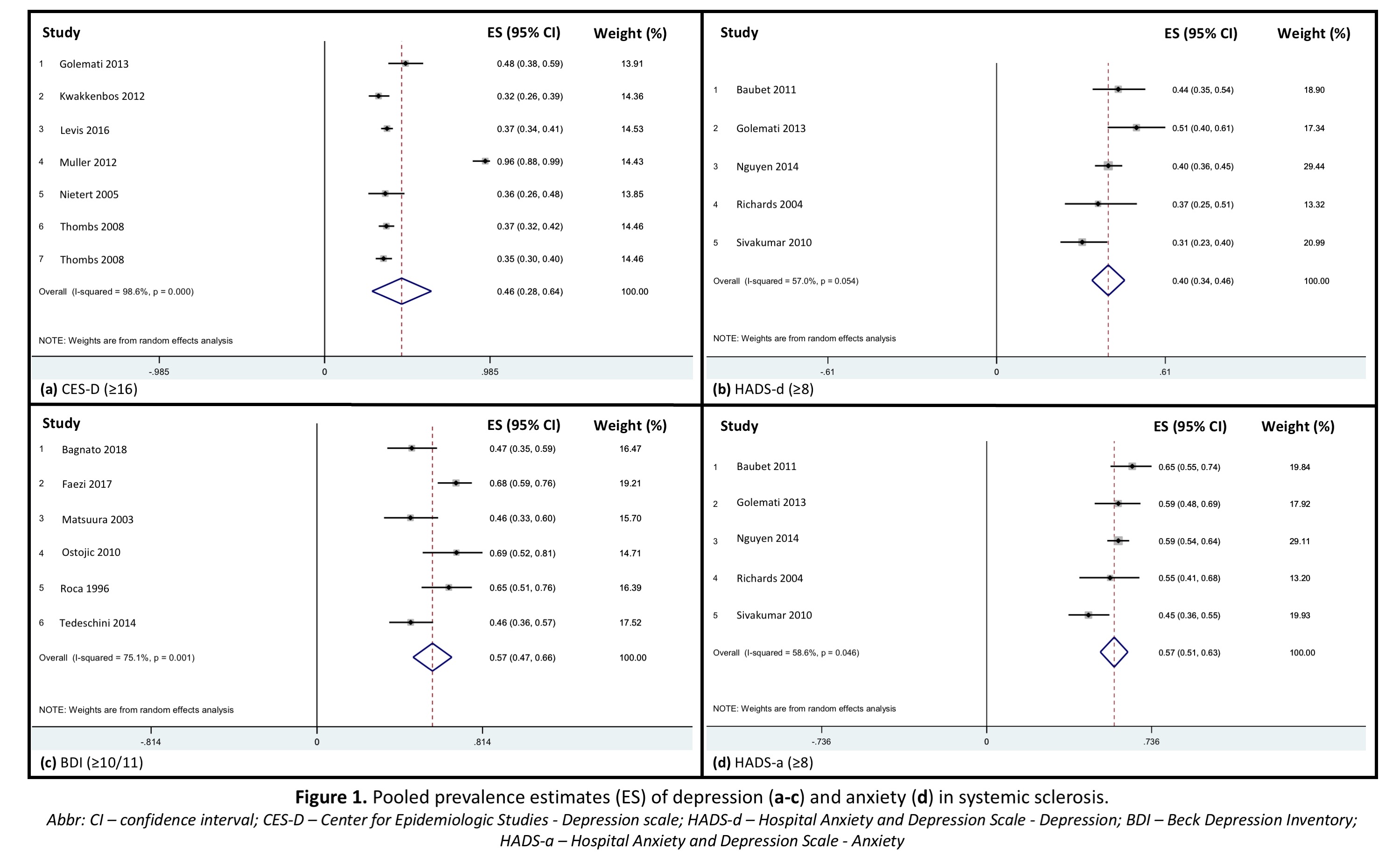Session Information
Date: Tuesday, October 23, 2018
Title: Epidemiology and Public Health Poster III: SLE, SSc, APS, PsA, and Other Rheumatic Diseases
Session Type: ACR Poster Session C
Session Time: 9:00AM-11:00AM
Background/Purpose: Individuals with systemic autoimmune rheumatic diseases (SARDs), including systemic lupus erythematosus (SLE), systemic sclerosis/scleroderma (SSc), Sjogren’s syndrome (SjS), dermatomyositis/polymyositis (DM/PM), and systemic vasculitides (SV), experience both physical and psychiatric complications from their disease. Given the high burden of depression and anxiety observed in SLE, the objective of this study was to review the prevalence, incidence, and determinants of depression and anxiety in individuals diagnosed with less common SARDs.
Methods: We conducted a systemic review in MEDLINE, EMBASE, CINAHL, Cochrane Database of Systematic Reviews, and PsychINFO from database inception to March 2018 using terms for all SARDs (SLE, SSc, SjS, DM/PM, SV) combined with terms for “depression” and “anxiety”. Inclusion criteria were: 1) observational study design; 2) patients diagnosed with a less common SARD (SSc, SjS, DM/PM, SV); 3) depression and/or anxiety as comorbid outcome; and 4) report relevant estimates (e.g., prevalence proportion, determinants) or sufficient data to allow calculation. Prevalence estimates were pooled using random effects models. Extraction of data on the determinants of depression and anxiety was restricted to studies using multivariate analyses.
Results: Of the 3,059 resultant citations, 65 full-text articles were screened and 42 were included in the final review. Thirty-nine articles reported on the prevalence of depression and estimates ranged from 3-96% in SSc, 7.6-60.9% in SjS, 14.7-26.8% in DM/PM, and 3-64% in SV. The prevalence of anxiety was reported in 17 articles, with estimates ranging from 3-80% in SSc, 4-12.5% in SjS, 39% in DM and 70% in SV. Data available to estimate the pooled prevalence of depression and anxiety according to psychiatric instrument was only available for SSc (Figure 1). The pooled prevalence for depression ranged from 0.40 (95% confidence interval [CI]: 0.34, 0.46) based on the Hospital Anxiety and Depression Scale (HADS) to 0.57 (95% CI: 0.47, 0.66) based on the Beck Depression Inventory and was 0.57 (95% CI: 0.51, 0.63) for anxiety based on the HADS. Two articles evaluated incidence of depression, reporting a 10-year cumulative incidence of 11.1 per 100 in giant cell arteritis (p<0.0001; adjusted hazard ratio [aHR]: 1.37, 95% CI: 1.26, 1.49) and 8.39 per 100 (p=0.51) in granulomatosis with polyangiitis. Significant determinants of depression included disability, pain, tender joints, gastrointestinal symptoms and lung involvement. Determinants of anxiety included disability, pain, and lung involvement.
Conclusion: Our synthesis shows a substantial burden of depression and anxiety in less common SARDs. Findings have implications for raising awareness among health care providers on the importance of these comorbidities among patients with SARDs.
To cite this abstract in AMA style:
Howren A, Zusman EZ, Avina-Zubieta JA, De Vera MA. The Prevalence, Incidence, and Determinants of Depression and Anxiety in Less Common Systemic Autoimmune Rheumatic Diseases: A Systematic Review and Meta-Analysis [abstract]. Arthritis Rheumatol. 2018; 70 (suppl 9). https://acrabstracts.org/abstract/the-prevalence-incidence-and-determinants-of-depression-and-anxiety-in-less-common-systemic-autoimmune-rheumatic-diseases-a-systematic-review-and-meta-analysis/. Accessed .« Back to 2018 ACR/ARHP Annual Meeting
ACR Meeting Abstracts - https://acrabstracts.org/abstract/the-prevalence-incidence-and-determinants-of-depression-and-anxiety-in-less-common-systemic-autoimmune-rheumatic-diseases-a-systematic-review-and-meta-analysis/

